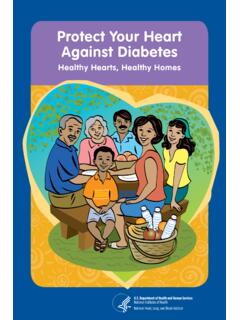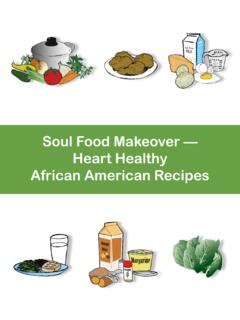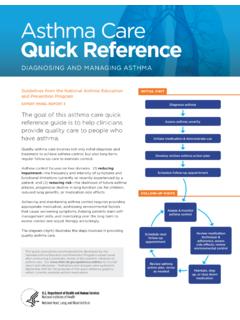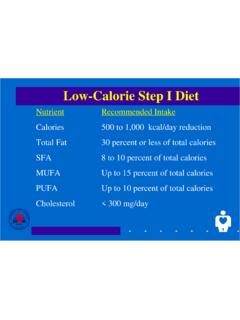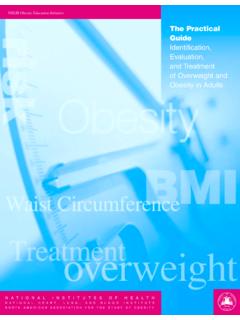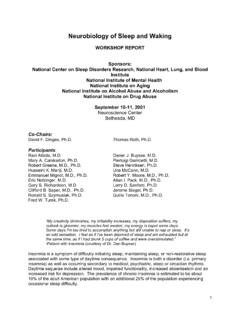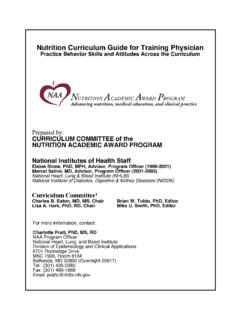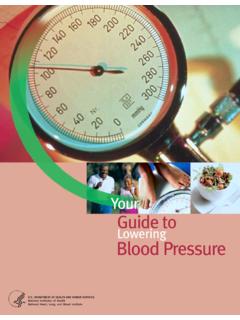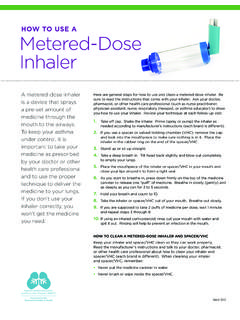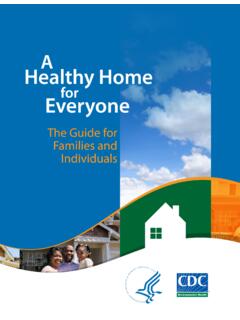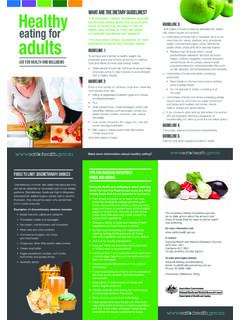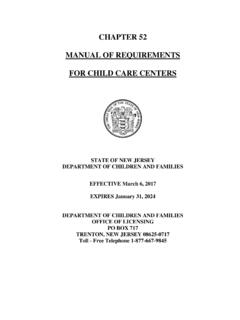Transcription of Your Guide to A Healthy Heart - NHLBI, NIH
1 YOUR Guide TOA Healthy DEPARTMENT OF HEALTH AND HUMAN SERVICESN ational Institutes of HealthNational Heart , Lung, and Blood InstituteYOUR Guide TOA Healthy DEPARTMENT OFHEALTH ANDHUMANSERVICESN ational Institutes of HealthNational Heart , Lung, and Blood InstituteNIH Publication No. 06-5269 December DEPARTMENT OF HEALTH AND HUMAN SERVICESN ational Institutes of HealthNational Heart , Lung, and Blood InstituteWritten by: Marian SandmaierHeart Disease: Why Should You Care? .. 1 What You Need To Know About Heart Disease .. 3 What Is Heart Disease?.. 3 Who Is at Risk? .. 4 How Risk Works .. 4 What s Your Risk? .. 5 How To Talk With Your Doctor .. 5 Major Risk Factors .. 11 Smoking .. 11 High Blood Pressure.. 12 What Is Blood Pressure?.. 13 Understanding Risk .. 14 Changing Your Lifestyle.
2 14 Taking Medication .. 16 High Blood Cholesterol .. 17 Cholesterol and Your Heart .. 17 Getting Tested .. 19 What s Your Number? .. 19 HDL Cholesterol Level .. 20 Heart Disease Risk and Your LDL Goal .. 20A Special Type of Risk .. 21 Your LDL Goal .. 22 How To Lower Your LDL .. 22 Overweight and Obesity .. 24 Should You Choose To Lose? .. 26 Lose a Little, Win a Lot .. 30 Physical Inactivity .. 30 Diabetes .. 32 What Else Affects Heart Disease? .. 36 Stress.. 36 Alcohol.. 36 Sleep Apnea .. 39 Menopausal Hormone Therapy .. 39 Birth Control Pills .. 43 ContentsContentsivTaking Charge: An Action Plan for Heart Health .. 45 Choose Healthy Foods .. 45 Getting Extra Support .. 46 Blood Pressure and the Dash Eating Plan .. 48 What Else Affects Blood Pressure? .. 53 High Blood Cholesterol and the TLC Program.
3 53 Now You re Cooking: Limiting Saturated Fat,TransFat, and Cholesterol .. 53 Meat, Poultry, and Fish .. 53 Milk Products and Eggs .. 54 Grains and Grain Products .. 55 Sauces, Soups, and Casseroles .. 55 When You Can t Face Cooking.. 56 Dining Out for Health .. 56 Make Healthy Choices .. 57 How To Tame a Snack Attack .. 58 Aim for a Healthy Weight.. 61 Getting Started .. 63 Seven Secrets of Weight Management .. 64 How To Choose a Weight-Loss Program .. 70 Get Moving! .. 72A Little Activity Goes a Long Way .. 72No Sweat!.. 73 Safe Moves.. 74 What s Your Excuse? .. 75 Move It and Lose It .. 76 You CanStop Smoking.. 76 Prepare To Succeed .. 78 Breaking the Habit .. 78If You Slip .. 81 Heart Health Is a Family Affair .. 83A Change of Heart .. 85 How To Estimate Your Risk.
4 86To Learn More .. 88 Your Guide to a Healthy HeartIf you re like many people , you may think of Heart disease as aproblem that happens to otherfolks. I feel fine, you may think, so I have nothing to worry about. If you re a woman, you mayalso believe that being female protects you from Heart you re a man, you may think you re not old enough to have aserious Heart on all counts. In the United States, Heart disease is the #1killer of both women and men. It affects many people at midlife, as well as in old age. It also can happen to those who feel fine. Consider these facts: Each year, 500,000 Americans die of Heart disease, and approx-imately half of them are women. As early as age 45, a man s risk of Heart disease begins to rise significantly. For a woman, risk starts to increase at age 55.
5 Fifty percent of men and 64 percent of women who die suddenlyof Heart disease have no previous symptoms of the Disease: Why Should You Care? Heart Disease:Why Should You Care?2 These facts may seem frightening, but they need not be. The goodnews is that you have a lot of power to protect and improve yourheart health. This guidebook will help you find out your own riskof Heart disease and take steps to prevent it. But, you may still be thinking, I take pretty good care of m unlikely to get Heart disease. Yet a recent national survey showsthat only 3 percent of adults practice all of the Big Four habits that help to prevent Heart disease: eating a Healthy diet, getting regular physical activity, maintaining a Healthy weight, andavoiding smoking. Many young people are also vulnerable.
6 Arecent study showed that about two-thirds of teenagers already haveat least one risk factor for Heart risk factor counts. Research shows that each individual riskfactor greatly increases the chances of developing Heart , the worse a particular risk factor is, the more likely youare to develop Heart disease. For example, if you have high bloodpressure, the higher it is, the greater your chances of developingheart disease, including its many serious consequences. A damagedheart can damage your life by interfering with enjoyable activities,preventing you from holding a job, and even keeping you fromdoing simple things, such as taking a walk or climbing can you do to reduce your personal risk of Heart disease?First, you can learn about your own risk factors. Second, you canbegin to make healthful changes in your diet, physical activity, andother daily habits.
7 Whatever your age or current state of health, it snever too late to take steps to protect your Heart . It s also never tooearly. The sooner you act, the better. So use this guidebook to findout more about the state of your Heart , and to learn about hearthealthy living. Talk with your doctor to get more taking action to improve your Heart health Guide to a Healthy HeartWhat Is Heart Disease? Coronary Heart disease often simply called Heart disease occurswhen the arteries that supply blood to the Heart muscle becomehardened and narrowed due to a buildup of plaque on the arteries inner walls. Plaque is the accumulation of fat, cholesterol, and othersubstances. As plaque continues to build up in the arteries, bloodflow to the Heart is disease can lead to a Heart attack.
8 A Heart attack happenswhen an artery becomes totally blocked with plaque, preventingvital oxygen and nutrients from getting to the Heart . A Heart attackcan cause permanent damage to the Heart disease is one of several cardiovascular diseases, which aredisorders of the Heart and blood vessel system. Other cardiovasculardiseases include stroke, high blood pressure, and rheumatic people aren t too concerned about Heart disease because theythink it can be cured with surgery. This is a disease is a lifelong condition: Once you get it,you ll always have it. It s true that procedures such asangioplasty and bypass surgery can help blood andoxygen flow more easily to the Heart . But the arter-ies remain damaged, which means you are still morelikely to have a Heart attack.
9 What s more, thecondition of your blood vessels will steadilyworsen unless you make changes in yourdaily habits and control your risk people die of complicationsfrom Heart disease, or become permanently disabled. That swhy it is so vital to take action to prevent this You Need To Know About Heart DiseaseWhat You Need To KnowAbout Heart Disease4 Who Is at Risk?Risk factors are conditions or habits that make a person more likelyto develop a disease. They can also increase the chances that anexisting disease will get worse. Important risk factors for Heart dis-ease that you can do something about are cigarette smoking, highblood pressure, high blood cholesterol, overweight, physical inactivity, and diabetes. Recent research shows that more than 95 percent of those who die from Heart disease have at least one of these major risk risk factors, such as getting older, can t be changed.
10 Aftermenopause, women are more likely to develop Heart disease. Forboth women and men, middle age is a time of increasing riskbecause people are more likely to develop Heart disease risk factorsduring this stage of history of early Heart disease is another risk factor that can tbe changed. If your father or brother had a Heart attack before age55, or if your mother or sister had one before age 65, you are morelikely to get Heart certain risk factors cannot be changed, it is important to realize that you dohave control over many others. Regardless ofyour age or family history, you can take important steps to loweryour risk of Heart Risk WorksIt may be tempting to believe that doing just one Healthy thing willtake care of your Heart disease risk. For example, you may hopethat if you walk or swim regularly, you can still eat a lot of fattyfoods and stay fairly Healthy .
